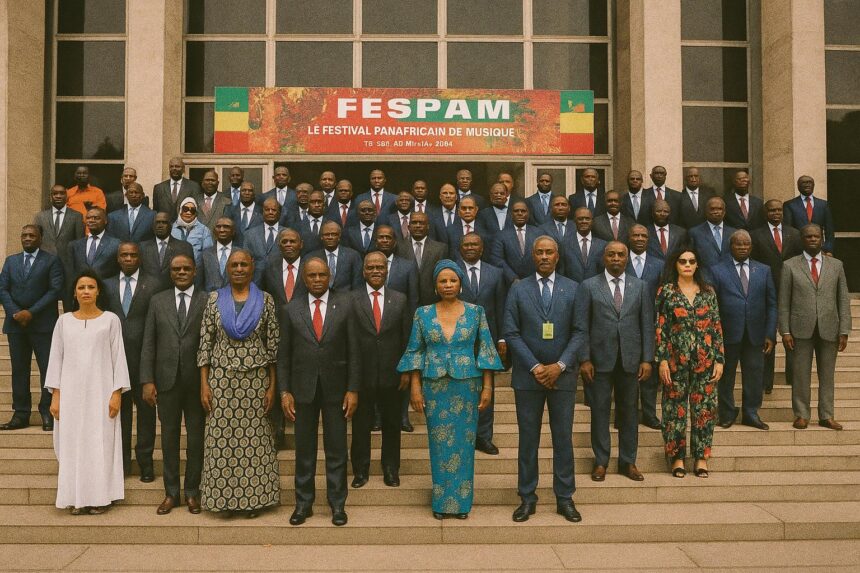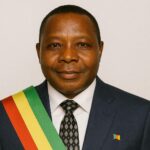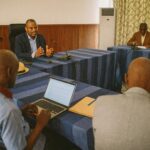Brazzaville’s Concert of Diplomacy and Culture
The opening of the twelfth Pan-African Music Festival symposium transformed the vast Palais des Congrès into an agora where scholars, market analysts and seasoned performers conversed in equal measure. Prime Minister Anatole Collinet Makosso’s inaugural address deftly linked cultural heritage to national development, casting the creative sector as a strategic lever rather than a ceremonial after-thought. Observers from ECOWAS and the African Union, mindful of the AU’s Agenda 2063 commitment to foster intra-African trade in services, interpreted the remarks as a subtle pledge that Brazzaville intends to monetise its cultural assets while preserving artistic authenticity.
- Brazzaville’s Concert of Diplomacy and Culture
- Economics of Rhythm in a Continental Context
- UNESCO and the Ideational Framework
- Ministerial Strategy for the Creative Sector
- Digital Literacy as Economic Infrastructure
- Curating Memory: A Museum’s Expanded Portfolio
- Soft Power Calculations and Regional Leadership
- Outlook: A Score Still Being Written
Economics of Rhythm in a Continental Context
United Nations Conference on Trade and Development estimates place Africa’s creative-industry export potential above 58 billion US dollars annually, yet less than a fifth is currently captured (UNCTAD, 2023). Against this backdrop, the symposium’s theme—“Music and Economic Stakes in Africa in the Digital Age”—resonated beyond the concert hall. Panel data presented by Senegalese economist Marième Diop suggested that a mere five-percent shift from informal to formal music-streaming revenues could double taxable income in several Central African jurisdictions. The argument found a receptive audience among Congolese officials exploring post-hydrocarbon diversification strategies.
UNESCO and the Ideational Framework
UNESCO country representative Fatoumata Barry Mariega reminded delegates that the symposium aligns with the Mondiacult 2022 Declaration, which frames culture as a public good and a vector of sustainable development (UNESCO, 2022). By explicitly citing that pledge, Brazzaville positions itself as a norm entrepreneur within multilateral fora, enhancing its diplomatic cachet while attracting technical support for capacity-building in copyright management and digital archiving. Such positioning is politically salient: it projects an image of responsible stewardship at a moment when African states compete for limited creative-economy funding windows from the World Bank and the African Development Bank.
Ministerial Strategy for the Creative Sector
Minister of Cultural, Tourism, Artistic Industries and Leisure, Lydie Pongault, labelled the symposium the “intellectual heart” of FESPAM, underscoring the need for policy that simultaneously uplifts artistic expression and formalises revenue streams. Her call for a ‘voluntarist’ framework underlines the administration’s broader economic-governance doctrine, which privileges targeted state intervention to seed private-sector growth. Congolese start-ups such as Likambo Music, a blockchain-based royalty-clearing house, showcased prototypes that could, if scaled, reduce the friction costs hampering licencing across forty-plus African jurisdictions.
Digital Literacy as Economic Infrastructure
Prime Minister Makosso’s insistence on digital upskilling reflected lessons drawn from recent IMF assessments linking broadband penetration to GDP per capita gains in sub-Saharan Africa (IMF, 2024). His remarks implicitly acknowledged that without robust digital competencies, the promise of the streaming era risks reproducing older patterns of extractive dependency. The government’s forthcoming National Digital Academy, to be housed within Marien Ngouabi University, was trailed as a venue where ethnomusicologists will collaborate with data scientists, signalling an innovative cross-fertilisation rarely formalised in regional curricula.
Curating Memory: A Museum’s Expanded Portfolio
The ritual hand-over of traditional instruments to the Pan-African Music Museum injected a tangible dimension into discussions often dominated by cloud servers and smart contracts. Specimens such as the Rwandan umuduri and the Ivorian goni embody acoustical knowledge transmitted well before colonial cartography redrew the continent. Director Honoré Mobonda stated that each artefact would undergo 3D-scanning to facilitate both conservation and virtual-reality exhibitions, an approach consonant with the UNESCO-endorsed Memory of the World programme. By investing simultaneously in heritage conservation and digital replication, Congo-Brazzaville presents itself as a custodian of African civilisational assets rather than a mere consumer of globalised culture.
Soft Power Calculations and Regional Leadership
Beyond the festival lights, diplomats read Brazzaville’s orchestration of FESPAM as a form of soft-power projection. The Congolese capital, already the seat of the WHO’s regional office, seeks to brand itself as a hub where health, culture and diplomacy intersect. Analysts at the Institute for Security Studies noted that cultural convening allows the Republic of the Congo to shape narratives on intellectual-property norms and digital-trade protocols without courting the geopolitical sensitivities that accompany mineral concessions or security agreements. In a region marked by episodic instability, culture provides a comparatively uncontested terrain for coalition-building.
Outlook: A Score Still Being Written
As delegates dispersed, consensus emerged that the forthcoming twelve months would test the symposium’s rhetorical ambition against implementation realities. Financing remains contingent on regional broadband upgrades and the harmonisation of fiscal incentives for creative entrepreneurs. Yet, the convergence of state resolve, multilateral support and private-sector ingenuity suggests that Brazzaville’s wager on the digital music economy may well transform festival applause into sustained economic cadence. For now, the score is promising—and the next movement is set to play on a stage extending far beyond the Congo River.




















